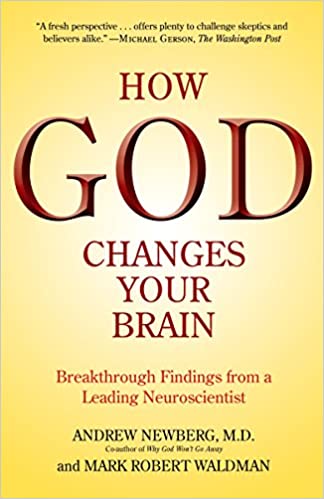How God Changes Your Brain by Andrew Newberg
The Book in 1 Sentences
How God Changes Your Brain: Breakthrough Findings from a Leading Neuroscientist
“Having faith in the human spirit is what drives us to survive and transcend. It makes life worth living, and it gives meaning to our life. Without such hope and optimism—synonyms for what I am calling faith—the mind can easily slip into depression or despair.
Faith is embedded in our neurons and in our genes, and it is one of the most important principles to honor in our lives. Some people put their faith in God, while others put it into science, relationships, or work.
But wherever you choose to place your faith, you must still confront a deeper question: What is your ultimate purpose and dream? What do you truly desire in your life—not only for yourself, but for the world as well? And how will you begin to make that desire a reality?
Having hope and faith are essential, but something more is needed: the skill and discipline to organize your brain in ways that will successfully motivate your life. Our meditation studies have provided a few basic tools that can help you achieve those goals, and if you apply them to your life, not only will you find a little more happiness, you’ll bring a little more peace
into the world.” ~ Andrew Newberg & Mark Robert Waldman
6 BIG Ideas
How God Changes Your Brain Book Summary
1. The Enemy is Not Religion
“These studies support our argument that fear-based religions can be hazardous to your health.
It’s too bad that the Surgeon General can’t place a warning sign on certain passages from the
Bible or Koran, especially those that encourage violence toward people who hold different
beliefs.”
“The enemy is not religion; the enemy is anger, hostility, intolerance, separatism,
extreme idealism, and prejudicial fear—be it secular, religious, or political.”
2. Neuroplasticity .. Re-shaping Your Brain
“Gus’s scans showed that it takes less than two months to alter the overall neural functioning of the brain. This is amazing because it demonstrates that we have the power to consciously change our brains, and improve our neural functioning, in far less time than scientists used to think...
we can see permanent changes in single neurons in a matter of days, and as other studies have shown, most forms of meditation will create subtle but significant changes in a couple of months.”
3. Daily Meditation
“How long will it take to make an improvement? Technically speaking, overnight, but if you want to see measurable improvements, you have to practice daily.
As one recent study demonstrated, just fourteen days of daily mental and physical exercise, stress reduction, and a healthy diet, was enough to improve cognition and brain function for people between the ages of thirty-five and sixty-nine.
Other meditation studies infer that the greatest improvements are achieved when you practice thirty minutes to an hour each day. Simply put, the longer you practice, the greater your reward.
After a few weeks you should notice improvement in your attitude and emotional well-being, and if you integrate meditation with psychotherapy or cognitive-behavioral classes, you will find that you can maintain low degrees of depression and anxiety long after your therapy ends—but again, only if you continue the meditation practice of staying relaxed, alert and focused.”
4. Meditation Improves Body Functions
“If you analyze the data collected from meditation studies, one of the most influential factors is time. The longer and more frequently you meditate, the more changes you’ll notice in the brain.
Beginning meditators show little or no change in brain function after one or two practice sessions. However, most studies, like ours, have found small but significant changes in brain activity after only eight weeks of daily practice.
Those who practice daily for thirty minutes or longer, and for many years, show the greatest difference in neural activity, not only when they are meditating, but when they are also at rest.”
“Today, Benson’s “relaxation response” has been incorporated into many aspects of medicine and psychotherapy because it effectively treats hypertension, cardiac arrhythmias, chronic pain, PMS, insomnia, anxiety, depression, hostility, and infertility.
It even lessens the side effects caused by cancer treatments and AIDS. This simple meditation also improves cognition in healthy aging adults.
Benson also discovered the same benefits could be elicited by different forms of meditation and relaxation, including yoga, Zen, hypnosis, and progressive muscle relaxation. All of these techniques utilize breathing and relaxation while the mind stays focused and alert.”
“Meditation enhances cognition, memory, and the ability to concentrate on specific tasks without creating any health risks to your brain.”
5. The Power of Intention
“When you clearly articulate your intention or goal in writing and speech, your frontal lobes can more efficiently direct your motor cortex to carry out your desire as you actively engage with others in the world.
It’s an extraordinary process: You begin with a goal-oriented thought, and the more you focus on it, the more your brain begins to plot out strategies to carry that thought into the world.”
Mihaly Csikszentmihalyi - in the great book Flow - tells us: “We may call intentions the force that keeps information in consciousness ordered... They act as magnetic fields, moving attention toward some objects and away from others, keeping our mind focused on some stimuli in preference to others.”
And also Wayne Dyer - in his great book The Power of Intention - says: “The Wright brothers didn’t contemplate the staying on the ground of things. Alexander Graham Bell didn’t contemplate the noncommunication of things. Thomas Edison didn’t contemplate the darkness of things.
In order to float an idea into your reality, you must be willing to do a somersault into the unconceivable and land on your feet, contemplating what you want instead of what you don’t have.”
“If you visualize a positive outcome prior to surgery, you’ll have a better recovery.”
6. How to Exercise Your Brain?
“1. Faith... If we don’t have faith that we’re making the best decision we can, then we will be swallowed up in doubt. And doubt, at least as far as your brain is concerned, is a precarious state in which to live. Faith is equivalent with hope, optimism, and the belief that a positive future awaits us. Faith can also be defined as the ability to trust our beliefs, even when we have no such proof that such beliefs are accurate or true.”
“2. Dialogue with others... If we don’t exercise our language skills, large portions of the brain will not effectively interconnect with other neural structures. Dialogue requires social interaction, and the more social ties we have, the less our cognitive abilities will decline.”
“3. Aerobic exercise. Vigorous exercise strengthens every part of the brain, as well as what it is connected to—the body. If you’re between the ages of eighteen and ninety, exercise is going to lengthen your life.”
John Raitey - in his book Spark - tells us this: “I want to cement the idea that exercise has a profound impact on cognitive abilities and mental health. It is simply one of the best treatments we have for most psychiatric problems.”
And he also says: “I tell people that going for a run is like taking a little bit of Prozac and a little bit of Ritalin because, like the drugs, exercise elevates these neurotransmitters. It’s a handy metaphor to get the point across, but the deeper explanation is that exercise balances neurotransmitters — along with the rest of the neurochemicals in the brain. And as you’ll see, keeping your brain in balance can change your life.”
“4. Meditate... Even ten to fifteen minutes of meditation appears to have significantly positive effects on cognition, relaxation, and psychological health, and it has been shown to reduce smoking and binge-drinking behavior. There’s even solid evidence that meditating before taking a test will significantly improve your score.”
“5. Yawn. Go ahead: Laugh if you want (though you’ll benefit your brain more if you smile), but in my professional opinion, yawning is one of the best-kept secrets in neuroscience.”
“6. Consciously relax. I’m not talking about taking a nap, or assuming the position of a couch potato in front of your television set. I’m talking about deliberately scanning each part of your body to reduce muscle tension and physical fatigue.”
Robert Emmons also tells us: “The basic observation that positive emotions are somehow incompatible with negative emotions is not a new idea and has been demonstrated over several decades.
Back in the 1950s, this basic principle of emotional incompatibility provided the basis of behavioral therapies designed to treat phobias and other anxiety disorders. One simply cannot be relaxed and stressed at the same time. Try it. You can’t. Relaxation drives out anxiety and vice versa.
The Buddha said that “Hatred cannot coexist with loving-kindness, and dissipates if supplanted with thoughts based on loving-kindness.” You cannot be grateful and resentful at the same time, or forgiving and vengeful. When we are savoring the moment we cannot be regretting the past.”
“7. Stay intellectually active. This should be (if you will pardon the pun) a no-brainer. When it comes to the dendrites and axons that connect one neuron to thousands of others, if you don’t use it, you will lose it.”
“8. Smile. Even if you don’t feel like it, the mere act of smiling repetitively helps to interrupt mood disorders and strengthen the brain’s neural ability to maintain a positive outlook on life.”
Robert Emmons - in his great book Thanks - says: “An ingenious series of experiments conducted a number of years ago showed that when people mimicked the facial expressions associated with happiness, they felt happier—even when they did not know they were moving “happy muscles” in their face. Researchers have found that smiling itself produces feelings of happiness.”
That was my QUICK summary of the great book How God Changes Your Brain by Andrew Newberg. If you’re interested, get your copy. There is a HUGE amount of life-changing ideas in this book, and we’ve only touched on a tiny bit of it.
Buy The Book: How God Changes Your Brain by Andrew Newberg

GET Blinkist 7 Days FREE Trial
3000+ Book Summaries
(Audio and Text)








